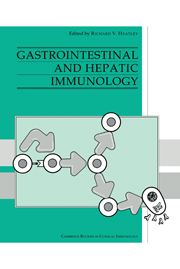Book contents
- Frontmatter
- Contents
- List of contributors
- Preface
- 1 Lymphoid cells and tissues of the gastrointestinal tract
- 2 Lymphocyte migration to the gut mucosa
- 3 Regulating factors affecting gut mucosal defence
- 4 Gastritis
- 5 The immunology of coeliac disease
- 6 Inflammatory bowel disease
- 7 Food intolerance and allergy
- 8 Gastrointestinal and liver involvement in primary immunodeficiency
- 9 Secondary immunodeficiency – the acquired immunodeficiency syndrome (AIDS)
- 10 Intestinal infections
- 11 Lymphomas
- 12 Small bowel transplantation
- 13 Clinical aspects of immunologically mediated intestinal diseases
- 14 Chronic active hepatitis
- 15 Primary biliary cirrhosis
- 16 Immunology and immunopathology of acute viral hepatitis
- 17 Immunology of liver transplantation
- 18 Clinical correlates with hepatic diseases
- Index
6 - Inflammatory bowel disease
Published online by Cambridge University Press: 03 February 2010
- Frontmatter
- Contents
- List of contributors
- Preface
- 1 Lymphoid cells and tissues of the gastrointestinal tract
- 2 Lymphocyte migration to the gut mucosa
- 3 Regulating factors affecting gut mucosal defence
- 4 Gastritis
- 5 The immunology of coeliac disease
- 6 Inflammatory bowel disease
- 7 Food intolerance and allergy
- 8 Gastrointestinal and liver involvement in primary immunodeficiency
- 9 Secondary immunodeficiency – the acquired immunodeficiency syndrome (AIDS)
- 10 Intestinal infections
- 11 Lymphomas
- 12 Small bowel transplantation
- 13 Clinical aspects of immunologically mediated intestinal diseases
- 14 Chronic active hepatitis
- 15 Primary biliary cirrhosis
- 16 Immunology and immunopathology of acute viral hepatitis
- 17 Immunology of liver transplantation
- 18 Clinical correlates with hepatic diseases
- Index
Summary
Introduction
The cause of inflammatory bowel disease (IBD) remains unknown. Over the years there have been many hypotheses regarding the aetiopathogenesis of both ulcerative colitis (UC) and Crohn's disease, none of which has been proven. However, it seems probable that a combination of genetic and environmental factors is involved. As with any chronic disease of unknown cause, there may be an initiating factor which triggers the disease, ultimately allowing a series of secondary effector mechanisms to induce chronic intestinal inflammation. Quite separate factors may be responsible for causing a relapse.
This chapter will consider, from an immunological perspective, the role of genetic factors, infective agents and other environmental factors in the aetiology of IBD. In addition, the role of humoral and cellular immunity will be discussed in more general terms.
Genetic factors
Genetic factors are of considerable importance in the aetiology of both UC and Crohn's disease. The bulk of evidence to support this suggestion comes from prevalence studies within families and ethnic groups.
First-degree relatives of patients with Crohn's disease or UC have a ten-fold risk of developing the same disease (Orholm et al., 1991). Another study showed that, compared with a control population, the prevalence of UC was 15 times higher and Crohn's disease 3.5 times higher in first-degree relatives of patients with UC (Monsen et al., 1987). Inflammatory bowel disease has an increased concordance in twins (Tysket al, 1988).
- Type
- Chapter
- Information
- Gastrointestinal and Hepatic Immunology , pp. 114 - 146Publisher: Cambridge University PressPrint publication year: 1994

